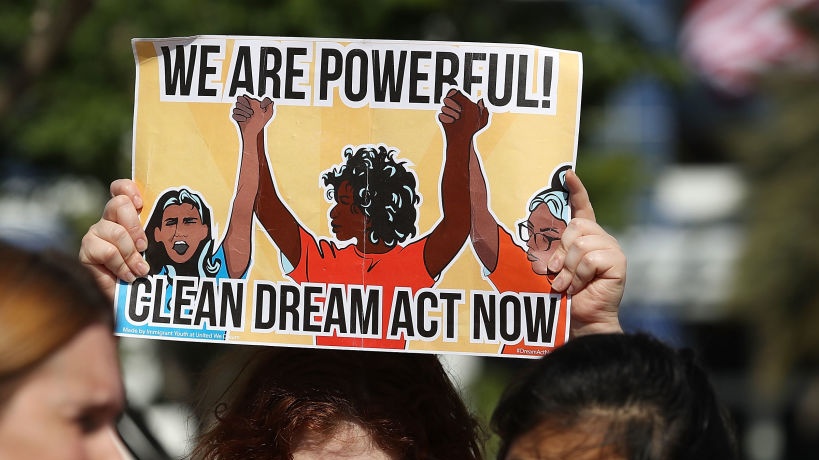The American Dream and Promise Act of 2019 (H.R. 6) is an inclusive legislative fix for the state of political limbo, in which millions of immigrants currently live. On June 4, the bill passed the Democratic lead House of Representatives.
An expansion of the original Dream Act first introduced 18 years ago, the bill includes — for the first time — both Temporary Protected Status (TPS) and Deferred Enforced Departure (DED) — which are immigration relief programs significantly represented by black immigrants.
These programs have been in place for decades and are currently under threat by the Trump administration. The Obama administration’s Deferred Action for Childhood Arrivals (DACA) program is also in danger.
The Dream Act expansion is evidence of the hard work of black immigration advocates to ensure immigration proposals do not leave black communities behind. Organizations such as UndocuBlack Network, African Communities Together, Black Alliance for Just Immigration, and the Black Immigrant Collective have worked tirelessly to this end.
With this expansion, an estimated 2.5 million people will become eligible for legal permanent residency, and eventually, citizenship.
So, how exactly does the Dream and Promise Act help black immigrants? Here are five ways:
1. The Dream and Promise Act expansion includes both Temporary Protected Status and Deferred Enforced Departure
Currently, the fight to save TPS and DED includes 13 countries. Seven out of those 13 are black majority nations; including Haiti, Liberia, Guinea, Sierra Leone, Sudan, South Sudan, and Somalia. Designation for Honduras, Nicaragua, and El Salvador also benefits Black Central Americans who are eligible.
2. The bill includes TPS recipients from Sierra Leone, Guinea, and Liberia who quietly lost designation under the Obama administration in 2016
These neighboring countries which shared simultaneous civil wars in the early 2000s were still recovering when, in 2014, the deadliest recorded Ebola outbreak exacerbated their limited healthcare systems and national resources. Many lost family members (including head of households), faced food insecurity, and loss of income, among other devastating consequences. For those who were able to stay, losing TPS designation meant upending the lives they rebuilt here in the U.S.
3. The bill creates a direct path to legal permanent residency and citizenship
Beneficiaries of these immigration relief programs have been contributing socially, politically, and economically to American society for decades as neighbors, students, parents and caregivers, homeowners, business owners, and workers. Recognizing this, the bill allows for adjustment of status to permanent residency for TPS and DED beneficiaries while creating a multi-phase process for DACA recipients.
Current legal mechanisms for adjustment of status are narrow and there is no direct pathway from these programs. The ability to gain legal permanent residency, and eventually citizenship, means that hundreds of thousands of black U.S. citizen children will no longer be faced with the impossible dilemma of losing their parents or abandoning their citizenship — an unfortunate impasse considering the long fight to fully realize black citizenship in the United States.
4. The bill provides relief for those under removal proceedings
Black and brown communities are overpoliced and over criminalized and, as such, are also overrepresented in the carceral system for petty, non-violent crimes. This is because of the ways structural inequality has driven parts of our community to alternate economies and forms of survival.
In this context, since immigration enforcement has relied on criminality to justify deportations, black immigrants have been disproportionately impacted. According to the 2016 Black Alliance for Just Immigration Report, "The State of Black Immigrants," black immigrants are overrepresented among immigrants facing deportation on criminal grounds and are also more likely than immigrants from other regions to be removed.
5. The bill requires the Department of Homeland Security to explain its decision to terminate TPS
In the last two years, the Department of Homeland Security (DHS) under the Trump administration has attempted to terminate TPS for several countries. In October 2018, a judge blocked the termination of TPS for Haiti, Sudan, Nicaragua, and El Salvador in Ramos et al v. Nielsen.
The judge cited the sudden policy changes by DHS in TPS designation and potentially discriminatory motivations. Requiring DHS to explain its decision to terminate TPS is beneficial because it requires DHS to offer justification consistent with standing policy. This limits arbitrary terminations in which black immigrants have otherwise been on the losing end.
The Dream and Promise Act will face an uphill battle in the Republican majority Senate as it makes its way through Congress and later awaits a signature by the president. As with prior attempts, it is likely critics in Congress will attempt to barter protections for immigrants by increasing funding for the institutions and technologies that enable the deportation of black immigrants.
This, in part, is why passing a “clean bill” is important. In the meantime, millions of immigrants currently have their lives held together by political whims and court injunctions, making this bill’s enactment even more critical. For black immigrants, like other immigrant groups, the stakes remain high.
